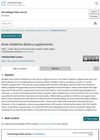 23 citations,
January 1998 in “Urological research”
23 citations,
January 1998 in “Urological research” Castration and finasteride lower urinary oxalate in male rats, potentially treating urolithiasis.
 14 citations,
January 2020 in “Dermatology Online Journal”
14 citations,
January 2020 in “Dermatology Online Journal” Some dietary supplements, like vitamins B6/B12, iodine, whey protein, and muscle-building products, can cause or worsen acne.
71 citations,
December 1987 in “Journal of animal science/Journal of animal science ... and ASAS reference compendium” Hair analysis is not a precise way to measure livestock's mineral status but can help when used with other methods.
 June 2015 in “Journal of the turkish academy of dermatology”
June 2015 in “Journal of the turkish academy of dermatology” Eating the right foods is important for skin health and can help treat some skin conditions.
 15 citations,
December 2013
15 citations,
December 2013 Men with more vanadium in their blood and who drink less soy milk are more likely to have hair loss.
1 citations,
January 2018 in “Molecular and integrative toxicology” Getting the right amount of selenium is important for health; too little can cause disease, and too much can lead to toxicity.
 March 2024 in “Animal nutrition”
March 2024 in “Animal nutrition” Adding both soluble and insoluble fibers, especially beet pulp, to the diet of pregnant sows helps improve their health and the growth of their piglets in hot weather.
March 2021 in “World rabbit science” Adding 0.2% taurine to Angora rabbits' diet improves wool production and overall health.
 67 citations,
January 2007 in “Environmental health perspectives”
67 citations,
January 2007 in “Environmental health perspectives” A woman's health issues were caused by arsenic poisoning from kelp supplements.
 40 citations,
January 2010 in “Indian Journal of Dermatology, Venereology and Leprology”
40 citations,
January 2010 in “Indian Journal of Dermatology, Venereology and Leprology” Certain diets can affect skin conditions, but more research is needed to understand these relationships fully.
 1 citations,
January 2006 in “Elsevier eBooks”
1 citations,
January 2006 in “Elsevier eBooks” Cats lose fur due to various reasons, including allergies, infections, genetics, hormones, diet, cancer, stress, and some conditions are treatable while others are not.
 January 2017 in “International journal of clinical & experimental dermatology”
January 2017 in “International journal of clinical & experimental dermatology” Eating a balanced diet with vitamins, micronutrients, and antioxidants is important for hair health and can help with hair loss.
November 2023 in “IntechOpen eBooks” Arsenic exposure from contaminated water severely damages the skin, causing hair loss, pigmentation changes, irritation, and can lead to skin cancer.
 158 citations,
May 1968 in “The journal of nutrition/The Journal of nutrition”
158 citations,
May 1968 in “The journal of nutrition/The Journal of nutrition” Zinc is crucial for growth and health in rats.
 53 citations,
January 2017 in “BioMed research international”
53 citations,
January 2017 in “BioMed research international” Genetically modified plants could be an important source of omega-3 fats to meet global needs.

Selenium can be toxic to animals, causing serious health issues, especially in horses.

Adequate vitamin D might lower, and high hair chromium might increase DNA damage in obese women.
 23 citations,
January 2017 in “Journal of Oleo Science”
23 citations,
January 2017 in “Journal of Oleo Science” Supercritical CO2 extraction makes rice bran oil healthier and safer than traditional methods.
 16 citations,
January 2008 in “Acta dermato-venereologica”
16 citations,
January 2008 in “Acta dermato-venereologica” Vitamin B12 deficiency can cause skin darkening and increased blood vessels, but treatment can improve symptoms.
 61 citations,
January 2018 in “Cosmetics”
61 citations,
January 2018 in “Cosmetics” Coffee silverskin may be a beneficial and safe ingredient for cosmetics, offering hydration, firmness, and potential hair growth benefits.
 February 2023 in “Aesthetic Cosmetology and Medicine”
February 2023 in “Aesthetic Cosmetology and Medicine” Medicinal plants in nutricosmetics contain compounds that can improve skin and hair health.
 3 citations,
August 2021 in “The Open Dermatology Journal”
3 citations,
August 2021 in “The Open Dermatology Journal” The herbal hair serum improves hair quality and growth, and is a good alternative to traditional cosmetics because it doesn't contain harmful chemicals like parabens and sulphates.
1 citations,
July 2021 in “Small ruminant research” Vitamin E, alone or with yeast, helped reduce arsenic poisoning effects in young goats.
September 2023 in “Environmental health perspectives. Supplements” Girls in Alcalá have higher hair calcium and strontium levels than boys, with lower overall levels than other regions.
12 citations,
August 2014 in “Elsevier eBooks” Thallium exposure can cause serious health issues, including nerve damage and hair loss.
 February 2025 in “BMC Public Health”
February 2025 in “BMC Public Health” Unhealthy diet and lifestyle choices may increase the risk of hair loss in women.

Celiac disease requires more than just a gluten-free diet for effective management.
 30 citations,
January 2023 in “EFSA journal”
30 citations,
January 2023 in “EFSA journal” Adults should not consume more than 255 micrograms of selenium per day to avoid risk of hair loss and other side effects.
 7 citations,
April 2022 in “South African journal of botany”
7 citations,
April 2022 in “South African journal of botany” Some Chrysanthemum samples from the USA, Europe, and China differ in quality and some contain harmful cadmium.
 3 citations,
April 2022 in “Clinical, Cosmetic and Investigational Dermatology”
3 citations,
April 2022 in “Clinical, Cosmetic and Investigational Dermatology” Different methods, including stress management, healthy diet, supplements, and treatments like minoxidil, can help hair grow back after COVID-19 related hair loss.























